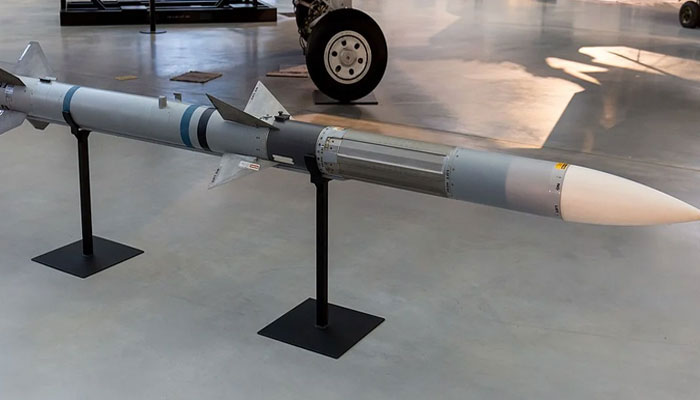Israel running low on missile interceptors: WSJ
Most Iranian missiles fired at Israel in recent days have been intercepted
Israel is running low on defensive “Arrow” missile interceptors, The Wall Street Journal reported on Wednesday, citing an unnamed US official.
The shortage has raised concerns about the country’s ability to continue to counter long-range ballistic missiles from Iran, said the Times of Israel on its website based on the WSJ report.
It said that since Israel launched its shock operation on Friday to remove the threat of the Iranian nuclear programme and ballistic missile capabilities, the Islamic Republic has retaliated by launching more than 370 missiles and hundreds of drones at Israel.
According to the WSJ report, the US has known about the shortage of Arrow interceptors for months, and has been working to bolster Israel’s air defences accordingly. But those stocks are limited, too. Having dispatched many to Israel, “there is now concern about the US burning through interceptors as well,” the newspaper said.
A report in The Washington Post Tuesday cited a person briefed on US and Israeli intelligence, who said that, according to “some assessments,” Israel can maintain its air defense for 10-12 days at the current rate of Iranian attacks — which have lessened since the start of the fighting last week — before it will require the US to replenish its stocks or get more involved in the war.
The source also said that already by later this week, Israel “will need to select what they want to intercept,” adding: “The system is already overwhelmed.” Israel already chooses to allow some missiles to fall, when it knows they will land in open areas. However, when faced with large barrages, it has been unable to shoot down all missiles headed to population centers or critical infrastructure. There was no Israeli comment on the reports. The Israel Defence Forces told the WSJ that it is “prepared and ready to handle any scenario” but could not comment on munitions matters. There has been no indication from Israel of any shortage of interceptors.
Most Iranian missiles fired at Israel in recent days have been intercepted, at similar rates to those seen during Iran’s attacks in April and October of 2024, according to the IDF. The IDF planned its operation in Iran months in advance, and claims to have accurate intelligence on Tehran’s ballistic missile stockpiles. The military said on Tuesday that some 40 percent of Iran’s ballistic missile launchers have been destroyed so far in the operation. The Arrow system is not the only defensive measure being used against Iran’s missiles.
The US has both ground-based Patriot missile defense systems and Terminal High Altitude Air Defense systems in the Middle East capable of intercepting ballistic missiles. US Navy destroyers have also shot down projectiles.
-
 FAA Shuts Down El Paso Airport, Flights Suspended For 10 Days: Here’s Why
FAA Shuts Down El Paso Airport, Flights Suspended For 10 Days: Here’s Why -
 Kate Middleton, Prince William's Major Plan Revealed After Statement On Andrew Scandal
Kate Middleton, Prince William's Major Plan Revealed After Statement On Andrew Scandal -
 Teacher Abused Children Worldwide For 55 Years, Kept USB Log Of Assaults
Teacher Abused Children Worldwide For 55 Years, Kept USB Log Of Assaults -
 Nick Jonas Set To Showcase Acting Skills In Upcoming Thriller 'Bodyman'
Nick Jonas Set To Showcase Acting Skills In Upcoming Thriller 'Bodyman' -
 Milano-Cortina 2026: Assessing Italy’s Winter Olympics Economic Growth
Milano-Cortina 2026: Assessing Italy’s Winter Olympics Economic Growth -
 Chris, Liam Hemsworth Support Their Father Post Alzheimer’s Diagnosis
Chris, Liam Hemsworth Support Their Father Post Alzheimer’s Diagnosis -
 Savannah Guthrie Expresses Fresh Hope As Person Detained For Questioning Over Kidnapping Of Nancy
Savannah Guthrie Expresses Fresh Hope As Person Detained For Questioning Over Kidnapping Of Nancy -
 ByteDance Suspends Viral Seedance 2.0 Photo-to-voice Feature: Here’s Why
ByteDance Suspends Viral Seedance 2.0 Photo-to-voice Feature: Here’s Why -
 Tom Hanks Diabetes 2 Management Strategy Laid Bare
Tom Hanks Diabetes 2 Management Strategy Laid Bare -
 Bad Bunny Wins Hearts With Sweet Gesture At Super Bowl Halftime Show
Bad Bunny Wins Hearts With Sweet Gesture At Super Bowl Halftime Show -
 Why Angelina Jolie Loves Her 'scars' Following Double Mastectomy
Why Angelina Jolie Loves Her 'scars' Following Double Mastectomy -
 ‘World Is In Peril’: Anthropic AI Safety Researcher Resigns, Warns Of Global Risks
‘World Is In Peril’: Anthropic AI Safety Researcher Resigns, Warns Of Global Risks -
 Meghan Markle Receives Apology As Andrew Puts Monarchy In Much Bigger Scandal
Meghan Markle Receives Apology As Andrew Puts Monarchy In Much Bigger Scandal -
 Catherine O’Hara Becomes Beacon Of Hope For Rectal Cancer Patients
Catherine O’Hara Becomes Beacon Of Hope For Rectal Cancer Patients -
 Nancy Guthrie: Is She Alive? Former FBI Director Shares Possibilities On 10th Day Of Kidnapping
Nancy Guthrie: Is She Alive? Former FBI Director Shares Possibilities On 10th Day Of Kidnapping -
 Siemens Energy Profit Surges Nearly Threefold Amid AI Boom For Gas Turbines, Grids
Siemens Energy Profit Surges Nearly Threefold Amid AI Boom For Gas Turbines, Grids




